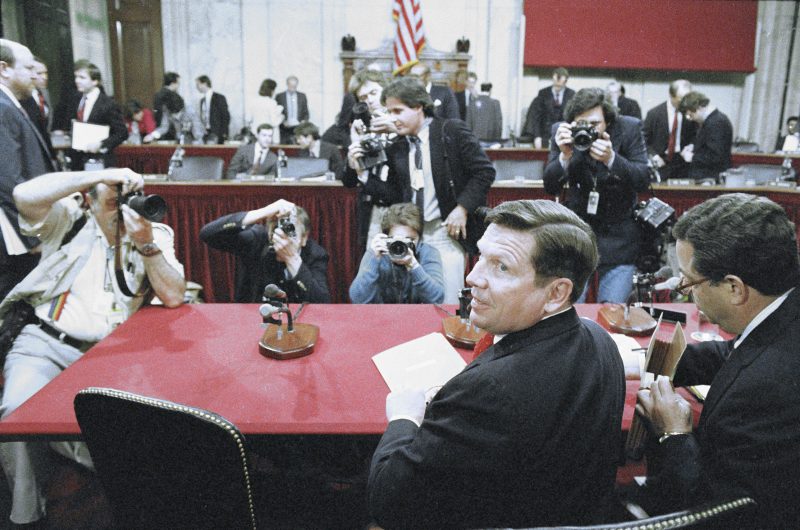Retired Air Force Maj. Gen. Richard V. Secord, a veteran of America’s clandestine operations who served as the point man for the transactions in the Iran-contra affair, the arms-for-hostages scandal that metastasized into the most serious crisis of the Reagan administration, died Oct. 15 at a nursing home in Port Orange, Fla. He was 92.
A grandson, John Secord Jr., confirmed the death but did not provide an immediate cause.
For his role in the scandal, Gen. Secord pleaded guilty to one felony count of lying to Congress and was sentenced to probation. He maintained that he had been made a fall guy for an operation approved at the highest levels of government. “I feel I was betrayed,” he told Playboy magazine in a 1987 interview. “We were acting in good faith every step of the way.”
Gen. Secord was drawn into the scheme in the summer of 1984. By then retired from the military and working as a private arms dealer, he received an overture from Marine Lt. Col. Oliver L. North, then a National Security Council aide.
The Reagan administration was pursuing dual policy objectives. In the Middle East, the White House wanted to use back-channel arms sales to the Islamic regime in Iran to help win the release of Americans held captive in Lebanon.
At the same time, in Nicaragua there was an effort underway to prop up the contra rebels fighting the Marxist Sandinista government, ultimately by using funds generated from the Iran deals. The operation was carried out secretly because in October 1984, Congress had cut off all military aid to the contras.
In Gen. Secord, a pugnacious West Point graduate with boundless self-assurance, North and national security adviser Vice Adm. John M. Poindexter had found perhaps the ideal candidate to handle the byzantine logistics of their plan, which became known simply as the “Enterprise.”
Gen. Secord, whose 28-year Air Force career had been as colorful as it was distinguished, was experienced in covert operations. As a young officer in Indochina in the early 1960s, he flew more than 200 secret combat missions against the Viet Cong, then helped the CIA supply Laotian tribesmen fighting the local communist forces.
He had later been stationed for several years as an American military liaison to the shah of Iran, specializing in weapons procurement. During his tour he arranged for $17 billion worth of arms deals for the shah, who nevertheless was soon toppled from power.
Once considered a possible Air Force chief of staff, he had risen to become a deputy assistant secretary of defense but left the military under a cloud in 1983. He said he had “been tarred” by his relationship with Edwin P. Wilson, a renegade former CIA operative whom he knew socially from the old-boy spy world, and who was convicted of selling explosives to Libyan dictator Moammar Gaddafi. Gen. Secord was never charged with any wrongdoing.
In his memoir “Honored and Betrayed” (1992), written with Jay Wurts, Gen. Secord maintained that he agreed to participate in the Iran-contra operation out of what he saw as his patriotic duty — though later disclosures would suggest financial motives played no small role.
“He wanted to come across as a white knight,” said Malcolm Byrne, author of “Iran-contra: Reagan’s Scandal and the Unchecked Abuse of Presidential Power.” “But the reality was he had a mixed bag of motives.”
Creating a labyrinth
Gen. Secord and his business partner, Albert Hakim, an Iranian-born American arms dealer, set about creating a labyrinth of shell accounts in Swiss banks. The aim, as established by North, was to build a free-standing unit for clandestine activities that could not be traced to the U.S. government, in spy parlance a “cutout” operation.
An admiring North later wrote, “Why Dick can do something in 5 min. that the CIA cannot do in two days is beyond me — but he does.”
In early 1985, with funds mostly from Saudi Arabia, the Enterprise partners began buying weaponry on the worldwide gray market and reselling the equipment to the contras.
From the outset, Gen. Secord and Hakim made it clear that they weren’t running an international charity ward. One contra leader later complained that the arms sold to the rebels had been marked up by as much as 60 percent.
In early 1985, North enlisted Gen. Secord and his partner to begin dealing weaponry, which was to consist of antitank and antiaircraft missiles, to the Iranian government, with the profits earmarked for diversion to the contras.
Money from the Iran and contra initiatives circulated with scanty accounting in what amounted to an enormous slush fund. According to later government investigators, more than $47 million passed through the Enterprise.
“The whole thing was back-of-the-envelope and off-the-books,” said Byrne, deputy director of the Washington-based National Security Archive anti-secrecy group. “The priority was get the job done.”
In early 1986, at North’s direction, Gen. Secord drew on his network of clandestine contacts to begin setting up a more elaborate system for resupplying the contras.
The various operations had been carried out under a blanket of secrecy that was unexpectedly lifted in early October 1986, when the Sandinistas shot down a supply plane bound for the contras. The wreckage yielded a telephone log listing calls from a contra safe house to Gen. Secord’s home and office in Virginia.
The following month, the entire operation came unraveled when a Lebanese weekly printed details of the arms-for-hostages deal with Iran. In short order, President Ronald Reagan fired North, an independent counsel, Lawrence E. Walsh, was appointed, and Congress launched a raft of investigations.
When a joint congressional panel began hearings on the Iran-contra affair in May 1987, Gen. Secord was called as the first witness.
In contrast with several other key witnesses, including North, Poindexter and Hakim, he testified without immunity. In his four days before the panel, he indignantly insisted that he was not a profiteer. In a subsequent interview with the New York Times, he dismissed concerns about the Enterprise’s financial dealings as “pipsqueak stuff.”
But in the weeks that followed, other evidence and witnesses portrayed Gen. Secord as a man not unduly burdened by questions of propriety. Hakim, for instance, testified that Gen. Secord had used funds from the Enterprise to buy a $32,000 Porsche and a private plane.
Nevertheless, Gen. Secord emerged from the proceedings with fans. Rep. Henry J. Hyde (R-Ill.) praised him and North as “the kind of guys the country turns to when it’s in real trouble and it has a dirty job to do.”
In April 1989, Gen. Secord was indicted by a federal grand jury on nine felony counts of lying to Congress about his knowledge of the financial dealings of the secret network.
The heart of the prosecution’s case was that the proceeds of the Enterprise rightfully belonged to the U.S. government.
Investigators found that Gen. Secord realized more than $2 million from his Iran-contra dealings in 1985 and 1986 and that he took precautions to conceal the payments to avoid paying taxes. It also turned out that only about $4 million of the proceeds from the Iran arms deals actually found their way to the contras.
In November 1989, five days before he was due to stand trial, Gen. Secord agreed to plead guilty to one charge of lying to Congress. He admitted that, when asked whether North had benefited financially from the Enterprise, he did not disclose paying for an expensive security system for North’s home, an alleged bribe to ensure that business kept coming Gen. Secord’s way.
Gen. Secord was later sentenced to a $50 fine and probation, with the judge ruling that he had suffered enough.
A general at 43
The son of a truck driver, Richard Vernon Secord was born July 6, 1932, in the farming town of LaRue, Ohio. In 1955, he graduated from the U.S. Military Academy at West Point and received a commission in the Air Force. He ascended swiftly through the ranks, receiving his first general’s star at 43.
In the aftermath of Iran-contra, Gen. Secord returned to private business, serving for a time as a top executive at Computerized Thermal Imaging, a computer imaging firm, and as president of the Air Commando Association.
In 1961, he married Jo Ann Gibson. She died in January. Survivors include three children, Julia, Laura and John; eight grandchildren; and three great-grandchildren.
To the end, Gen. Secord saw himself as a victim of perfidy in Washington, and he defended the Iran and contra initiatives as necessary steps in advancing the nation’s interest. As he noted at one point in his memoir, “In this we did not seem to me to act like impulsive cowboys, but rather like people who finally woke up and smelled the coffee.”




























